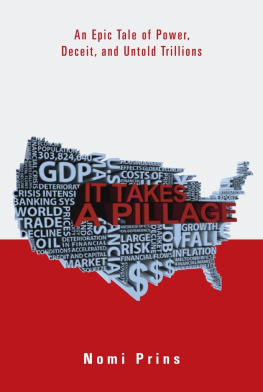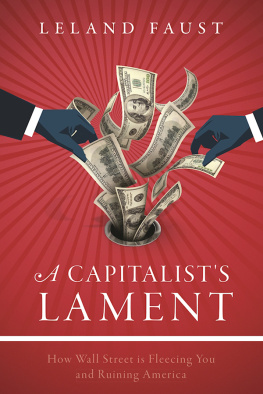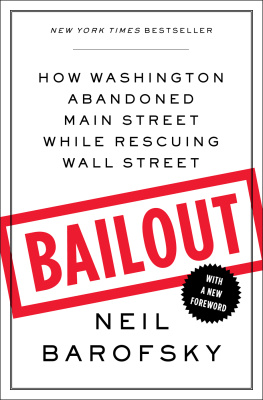Table of Contents
Copyright 2009 by Nomi Prins. All rights reserved
Published by John Wiley & Sons, Inc., Hoboken, New Jersey Published simultaneously in Canada
No part of this publication may be reproduced, stored in a retrieval system, or transmitted in any form or by any means, electronic, mechanical, photocopying, recording, scanning, or otherwise, except as permitted under Section 107 or 108 of the 1976 United States Copyright Act, without either the prior written permission of the Publisher, or authorization through payment of the appropriate per-copy fee to the Copyright Clearance Center, 222 Rosewood Drive, Danvers, MA 01923, (978) 750-8400, fax (978) 646-8600, or on the web at www.copyright.com. Requests to the Publisher for permission should be addressed to the Permissions Department, John Wiley & Sons, Inc., 111 River Street, Hoboken, NJ 07030, (201) 748-6011, fax (201) 748-6008, or online at http://www.wiley.com/go/permissions.
Limit of Liability/Disclaimer of Warranty: While the publisher and the author have used their best efforts in preparing this book, they make no representations or warranties with respect to the accuracy or completeness of the contents of this book and specifically disclaim any implied warranties of merchantability or fitness for a particular purpose. No warranty may be created or extended by sales representatives or written sales materials. The advice and strategies contained herein may not be suitable for your situation. You should consult with a professional where appropriate. Neither the publisher nor the author shall be liable for any loss of profit or any other commercial damages, including but not limited to special, incidental, consequential, or other damages.
For general information about our other products and services, please contact our Customer Care Department within the United States at (800) 762-2974, outside the United States at (317) 572-3993 or fax (317) 572-4002.
Wiley also publishes its books in a variety of electronic formats. Some content that appears in print may not be available in electronic books. For more information about Wiley products, visit our web site at www.wiley.com.
eISBN : 978-0-470-55595-8
ACKNOWLEDGMENTS
To write a book in four months on a subject thats such a moving target is intimidating. When data are not always readily available and those most involved with handling the crisis rarely say what they mean or act on what they say, it makes the endeavor especially daunting.
I would not have been able to complete this task without the support of, yes, a small village of people. First of all, I would like to express my heartfelt gratitude for the invaluable research work provided by Sara Abbas, Clark Merrefield, Don McAdam, and Krisztina Ugrin, who all clocked exceedingly long hours over the course of this project. In particular, Krisztinas compilation of the bailout numbers was vital to my understanding the breadth of the Pillage. Clarks sharp eye for detail and consummate editorial skills were critical in shaping the book through every stage, especially in the face of the constant barrage of information. Thanks also to Theresa Diamond and Ed Cole for their research work. Thanks to David Lobenstein, whose editorial advice during the earlier stages of this book was crucial. Thanks to my dear friend and agent, Mark Suroff, for always being there.
My special thanks to my editor, Eric Nelson at John Wiley & Sons, who reached out to me at the end of 2008 to write this book and whose outrage matched my own. I am also grateful to the rest of the fabulous team at Wiley, including production editor Rachel Meyers and freelance copy editor Patricia Waldygo. Thanks to my publicist, Celeste Balducci, for all of her dedication, as well as to the rest of Monteiro & Company.
My gratitude to Demos for all the support theyve provided since I left Wall Street in 2002 and for the important contributions they make every day, especially Miles Rapoport, David Callahan, Tammy Draut, Carol Villano, Bob Kuttner, Lew Daly, and the man who never seems to sleep, Tim Rusch.
Ive been fortunate to have the backing, inspiration and friendship of some wonderful peoplewriters, editors, and thinkersover the years. Thanks to Megan Kiefer, Margaret Bustell, Viv Shelton, Deborah Dor, Francesca Lieb, Jessica Weizman, Karen Meola, Matt Suroff, Lynne Roberts, Robin Lentz, Marna Bunger, Doug Henwood, John Dizard, Michael Deibert, Tracy Quan, Colin Robinson, Andy Robinson, Monika Bauerlein, David Corn, Alleen Barber, Betsy Reed, Esther Kaplan, Andy Serwer, Michael Pollack, Suzi Weissman, Neil Weinberg, Walt Pavlo, Don Hazen, Amy Rowe, Jay Kramer, Natalie Schwartzberg, Tom Mackell, Harry Phillips, Jed Wallace, Jon Elliott, Ralph Nader, and Greg the navigator Della Stua. Thanks to my friends on the Street who remain in contact and keep me abreast of whats going on.
My love and appreciation to my fianc, Lukas Serafin, for being so supportive and reading through the many versions of this book with love and attention. Thanks to my family for putting up with my long hours, absences, and constant tirades about the subject matter.
Introduction
The More Wall Street Changes, the More It Stays the Same
If the thought of the government spending trillions of dollars on Wall Streets screwups pisses you off, youre not crazy. Cant you think of a zillion better uses for the ridiculous sums of money that have been dumped into the laps of financial firms, whose execs made more in a minute than you do in a year, to support the system that they trashed? Youre not alone. You are living in the most costly and reckless period of American history. You have every right to understand how the quasi legal extortion happened and who was behind it. But it doesnt stop there: you also deserve to know how to ensure this kind of pillaging stops and never happens again. You can and must demand a complete overhaul of the banking industrys status quo. Our country wasnt founded so that we, the people, could indefinitely support them, the banks.
Welcome to what I call the Second Great Bank Depression. Why that name? Because this period of economic chaos, loss, and global financial destruction was manufactured by the men who shaped the banking sector. They had help, of course. But this debacle is as man made and avoidable as the Great Depression was. If anyone in the Oval Office, in Congress, at the Federal Reserve, in the Treasury Department, or in the offices of any regulatory agency had done any serious preventative work, had exposed the murky Wall Street practices before they blew up in our collective faces, had contained reckless trading and borrowing activities, or had rendered financial firms smaller and more transparentif any of these people had cared the crash could have been avoided, or at least would have been less severe. Millions of jobs and trillions of dollars would have been spared. Billions of dollars of bonuses wouldnt have rewarded the mostly legal but ridiculously risky practices that had such devastating effects.
The deluge of money pouring from all orifices of Washington into the banks gives tacit approval to the backward culture of bankinga world based on crazy compensation, counterproductive competition, and loosely regulated practices and laws. Yet it was all pushed by a select group of Wall Street power players, who move back and forth with all too much ease between our nations capital and the gilded realm of finance.
If it seems as if the culture of Goldman Sachs pervades the halls of Washington, thats because the people of Goldman Sachs pervade the halls of Washington. Thats why, despite all the talk in Washington about reforming the system, the same execs who orchestrated its failures were the ones hobnobbing with the political leaders of both the Bush and the Obama administrations. In fact, Obama is even closer to the financial execs than Bush was. In early spring of 2009, Obama called a meeting with Wall Streets heads to ask them to accept responsibility for causing the crisis and to commit to helping mitigate it. As if that admission would change the rules of their game.







